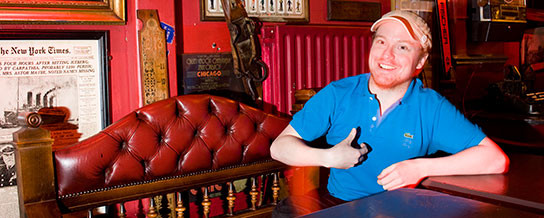Boy 8-Bit on Commodore 64 Bangers
Though his alias suggests otherwise, David Morris, who goes by the name Boy 8-Bit, didn’t […]

Boy 8-Bit on Commodore 64 Bangers
Though his alias suggests otherwise, David Morris, who goes by the name Boy 8-Bit, didn’t […]

Though his alias suggests otherwise, David Morris, who goes by the name Boy 8-Bit, didn’t grow up with a videogame console in his home. “My parents wouldn’t let me [have one],” he says. “They wanted me to have a computer as it was more ‘educational.’”
As a result, his first actual contact with 8-bit technology came not through Nintendo but early home computers like the Spectrum and Commodore 64. Whether intended for instruction or play, those initial dealings with technology clearly struck a chord. Morris possesses a seemingly meticulous knowledge of computers. And as Boy 8-Bit, he punishes processors to create a head-spinning brand of electro- and breakbeat-infused future house.
Morris, now 27, started DJing and making electronic music around the age of 15, employing a Commodore Amiga 500 and Octamed tracker software (an early sample-based program). He could create only simple tracks with such humble tools, but a few years later he’d find inspiration in a new piece of equipment. In 1999, Morris was making tunes on a PC using Cubase software–and not having much luck–until a friend gave him a copy of Fruity Loops. “I use it to this day for everything,” he says. “It’s awesome.”
With a newfound confidence to match his new set-up, Morris has been making certifiable bangers and garnering praise for remixes of Black Ghosts (Simian’s Simon Lord and DJ Touché), dubstep don Burial, and East London rapper Lethal Bizzle. “Any Way You Choose to Give It,” a reworking of a track by the former, “has been the one that really kicked everything off,” Morris explains. And though that song’s almost a year old now, Morris tells us he “still [gets] MySpace messages from people asking where they can get a copy.”
His productions are chock-full of ideas–lots of bass and breakbeats culled from hip-hop, jungle, and big beat, as well as plenty of chopped-up and screwed vocals–edited cleanly into a composed, wholly danceable thump that owes as much to Baltimore and late-’90s hip-hop as it does the British rave scene. “I like bass, I like melody, and I like dynamics,” he offers. “I’m just throwing things [together] to see what comes out.”

